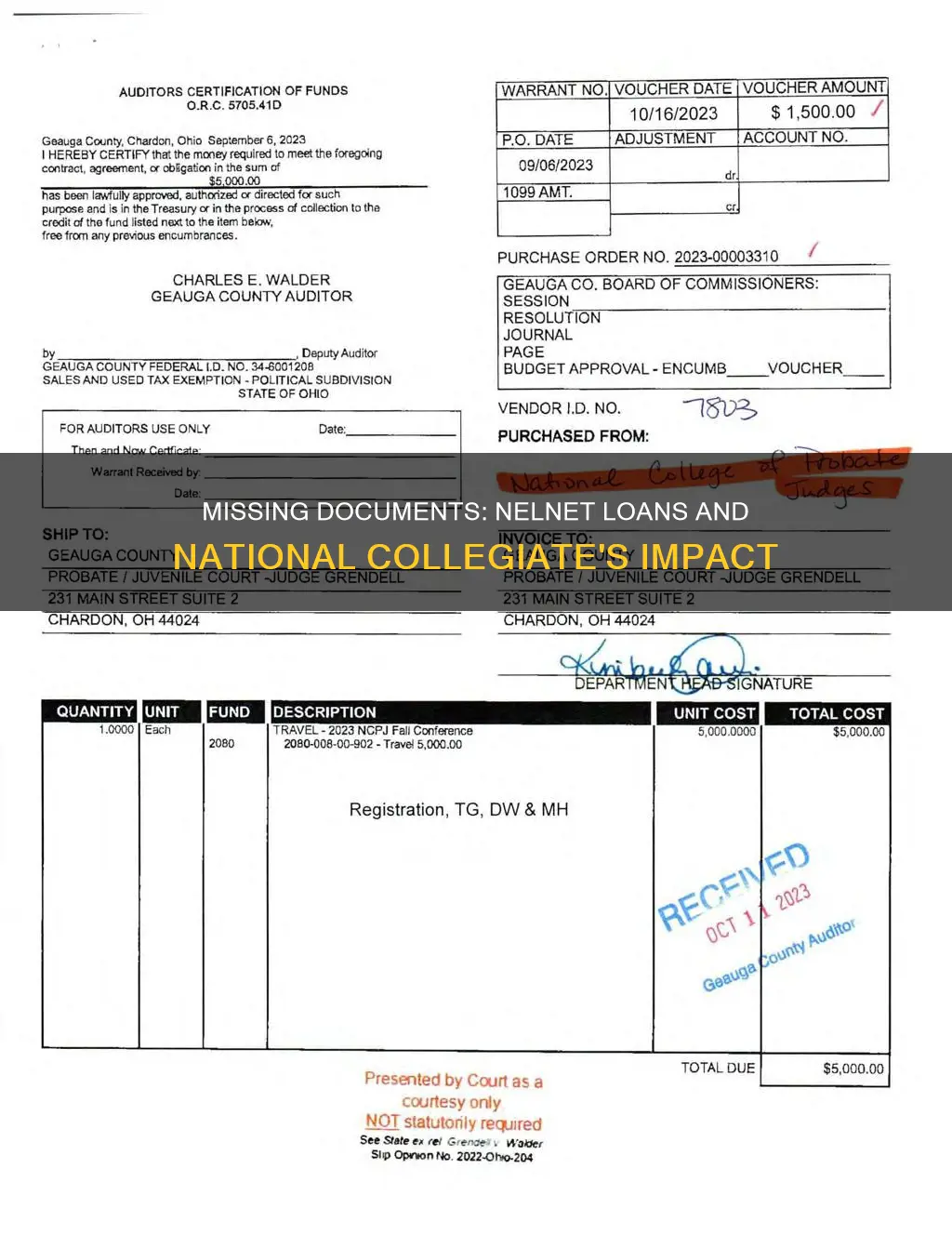
The National Collegiate Student Loan Trusts, one of the largest owners of private student loans in the US, has been at the center of a legal dispute due to missing paperwork. This has resulted in a potential wipe-out of student loan debts worth billions. Nelnet, on the other hand, is a student loan servicing company that provides customer service for federal student loans under the Federal Direct Loan Program and Federal Family Education Loan (FFEL) Program. While the National Collegiate missing documents issue primarily affects private student loans, it raises questions about the broader implications for loan servicing companies like Nelnet and the potential impact on federal student loans. Thus, it is essential to examine the consequences of the National Collegiate case and its relevance to Nelnet and the broader student loan landscape.
| Characteristics | Values |
|---|---|
| Name of the entity | National Collegiate Student Loan Trusts |
| Number of private loans | 800,000 |
| Total amount of student loan debt owned | $12 billion |
| Amount in default | $5 billion |
| Number of trusts | 15 |
| Loans originated by | Bank One, Charter One Bank, Bank of America, JPMorgan Chase, GMAC Bank, RBS Citizens Bank, Union Federal Savings Bank |
| Debt collector | Transworld Systems |
| Loan servicer | American Education Services (AES) |
| Nelnet loan types | Federal loans under accounts beginning with E, commercial loans under accounts beginning with D and J |
| Nelnet's customer service | Federal Direct Loan Program and Federal Family Education Loan (FFEL) Program loans that are owned by the U.S. Department of Education |
| Sloan Servicing's customer service | Commercially held Federal Family Education Loan (FFEL) Program loans |
| Sloan Servicing's loan types | Accounts beginning with D or J |
| Settlement amount with CFPB | $2.25 million |
What You'll Learn
- Nelnet services federal student loans
- National Collegiate Student Loan Trusts is a group of 15 trusts
- National Collegiate Student Loan Trusts holds 800,000 private loans
- National Collegiate Student Loan Trusts sued for illegal debt collection practices
- National Collegiate Student Loan Trusts settles with CFPB

Nelnet services federal student loans
Nelnet is a student loan servicing company that provides customer service for federal student loans. It is based in Lincoln, Nebraska, with offices around the world, and employs over 8500 associates.
Nelnet offers two main services: federal student loans and commercially held Federal Family Education Loan (FFEL) Program loans. The former are loans owned by the U.S. Department of Education, while the latter were originally borrowed from a bank, lender, or non-profit organisation before July 1, 2010. Nelnet aims to make the repayment process as simple as possible for its customers.
Federal student loans are further divided into two categories: Federal Direct Loans and FFEL Program loans. The type of loan a customer has can be identified by the first letter of their account number. Federal loans begin with the letter "E", while commercial loans begin with "D" or "J".
Nelnet's services are separate from those provided by National Collegiate, which is an owner of private student loans. National Collegiate is an umbrella name for 15 trusts that hold 800,000 private student loans, totalling $12 billion. In 2017, National Collegiate faced legal issues as crucial paperwork needed to prove ownership of its loans in court was missing. This resulted in judges dismissing lawsuits against borrowers and wiping out their debts. National Collegiate has also been accused of illegal debt collection practices and settled with the Consumer Financial Protection Bureau for $2.25 million in 2025.
Military Loan Forgiveness: College Dreams, Reality?
You may want to see also

National Collegiate Student Loan Trusts is a group of 15 trusts
The National Collegiate Student Loan Trusts (NCSLT) is a group of 15 trusts that hold 800,000 private student loans, totalling $12 billion. The loans were originally made by banks such as Bank of America, JPMorgan Chase, US Bank, RBS Citizens, and Citizens Bank, and then sold to investors. The trusts collect payments from private student loan borrowers using loan servicers like American Education Services or by suing in state court.
The NCSLT has been accused of improper debt collection practices, including filing debt collection lawsuits without the necessary documentation to prove that they own the loans or that the consumer owed the debt. In 2017, the Consumer Financial Protection Bureau (CFPB) ordered NCSLT and the company handling its debt collection, TransWorld Systems, to pay $21 million for collecting debt they couldn’t prove.
In 2024, the CFPB again took action against the NCSLT for unlawfully filing defective debt collection lawsuits to collect on private student loan debt. The CFPB and the Trusts filed a proposed stipulated judgment that, if entered by the court, would require the Trusts to pay $2.25 million in redress to student borrowers who were harmed.
Nelnet is a student loan servicing company that provides customer service for Federal Direct Loan Program and Federal Family Education Loan (FFEL) Program loans that are owned by the U.S. Department of Education. It is unclear whether the issues with missing documents affecting the NCSLT loans have any effect on Nelnet loans. However, it is important to note that Nelnet only services federal student loans, while the NCSLT owns private student loans. Therefore, it seems unlikely that the missing documents issue directly impacts Nelnet loans.

National Collegiate Student Loan Trusts holds 800,000 private loans
National Collegiate Student Loan Trusts (NCSLT) is one of the largest owners of private student loans in the US. It is an umbrella name for 15 trusts that hold 800,000 private student loans, totalling $12 billion in debt. These loans were originally issued by private banks such as JP Morgan Chase Bank and Bank of America and then sold to investors, including the National Collegiate Student Loan Trusts.
The NCSLT has been criticised for its debt collection practices, which have been described as aggressive. It has been accused of illegally pursuing borrowers who fall behind on their bills, and in 2025, it agreed to pay $2.25 million to resolve claims regarding these practices.
The NCSLT has also faced legal issues due to missing paperwork. In order to win a debt collection lawsuit, the NCSLT must prove that the borrower owes the debt and that it has the legal paperwork showing ownership of the loan. However, crucial paperwork needed to collect on the loans in court is often missing, and many of the NCSLT's lawsuits have been dismissed due to chain-of-title and record-keeping issues. As a result, tens of thousands of people who have taken out private loans may have their debts wiped away.
It is important to note that Nelnet is a separate company that provides customer service for Federal Direct Loan Program and Federal Family Education Loan (FFEL) Program loans that are owned by the US Department of Education. Nelnet is not directly associated with the NCSLT or the issues surrounding missing documents.

National Collegiate Student Loan Trusts sued for illegal debt collection practices
The National Collegiate Student Loan Trusts (NCSLT) is a group of fifteen securitization trusts that acquire, pool, and securitize student loans, which they then service. In 2017, the Consumer Financial Protection Bureau (CFPB) filed a lawsuit against NCSLT, alleging that they engaged in illegal debt collection practices. The lawsuit claimed that NCSLT brought improper debt collection lawsuits, suing consumers for debts that they could not prove were owed. In some cases, the necessary documentation to prove ownership of the loans or that the consumer owed the debt was missing. This issue of missing documentation has also been reported by The New York Times, who noted that judges had dismissed dozens of lawsuits due to incomplete ownership records.
The CFPB lawsuit also alleged that NCSLT attempted to collect on time-barred debts after the statute of limitations had expired and that they filed false and misleading affidavits. As a result of these allegations, the CFPB took action to address NCSLT's illegal debt collection practices. A proposed stipulated judgment was filed, requiring NCSLT to pay $2.25 million in redress to harmed student borrowers and to stop collecting on certain debts covered by the lawsuit. The judgment also included compliance and reporting requirements over a five-year period and the prohibition of certain debt collection activities.
In addition to the CFPB's actions, an independent audit of all 800,000 student loans in NCSLT's portfolio was ordered. This audit aimed to identify any additional student loans for which the trusts lack the documentation needed to prove the consumer owed the debt. If such loans were identified, NCSLT would be required to cease all collections on those loans. The proposed final judgment also required NCSLT to provide restitution to additional consumers identified through the independent audit.
The illegal debt collection practices of NCSLT have had significant implications for student borrowers. The company's aggressive pursuit of borrowers who fall behind on their payments has resulted in tens of thousands of lawsuits. However, due to missing documentation and illegal practices, many of these lawsuits have been dismissed, providing relief to borrowers.

National Collegiate Student Loan Trusts settles with CFPB
The National Collegiate Student Loan Trusts (NCSLT) has been at the centre of a storm regarding its private student loans. The NCSLT is an umbrella name for 15 trusts that hold 800,000 private student loans, totalling $12 billion. More than $5 billion of that debt is in default, and the trusts have aggressively pursued borrowers who fall behind on their bills, bringing at least four new collection cases each day.
However, the NCSLT has struggled to prove in court that it has the legal paperwork showing ownership of its loans. An audit of the loans’ servicer revealed that crucial paperwork needed to collect on the loans in court is missing. As a result, judges have dismissed dozens of lawsuits against former students, wiping out their debt.
In 2017, the Consumer Financial Protection Bureau (CFPB) sued the NCSLT, alleging illegal debt collection practices. The CFPB discovered that the NCSLT's subservicers had "executed and notarized deceptive affidavits" and "filed collections lawsuits lacking key evidence". The CFPB also alleged that the NCSLT engaged in unfair practices by filing collection lawsuits without the intent or ability to prove the claims if they were contested.
In January 2025, the NCSLT agreed to pay a settlement of $2.25 million to resolve the CFPB's claims. The settlement, which is pending approval from the U.S. District Court for the District of Delaware, includes compliance and reporting requirements over a five-year period, a prohibition on certain debt collection activities, and a requirement to withdraw or dismiss certain pending collection lawsuits.
It is important to note that Nelnet is a separate student loan servicing company that provides customer service for Federal Direct Loan Program and Federal Family Education Loan (FFEL) Program loans owned by the U.S. Department of Education. There is no indication that the issues with missing documents affecting the NCSLT loans have any impact on Nelnet loans.
Frequently asked questions
National Collegiate Student Loan Trusts is facing legal issues as it struggles to provide the necessary paperwork to prove ownership of its loans, which were originally made by banks and then sold to investors.
Nelnet is a student loan servicing company that provides customer service for federal student loans. The issue with National Collegiate does not directly affect Nelnet loans as they are separate entities. However, if you have a loan that is serviced by Nelnet and was originally from National Collegiate, there may be some impact on the loan ownership and payment collection process.
If you have a Nelnet loan that was originally from National Collegiate, you can contact your loan servicer to request a promissory note proving the ownership of your loan. While the servicer is not legally required to provide this, it can give you clarity on the situation. Additionally, pay attention to any collection notices or bills you receive, as they may indicate that National Collegiate holds your loan.







